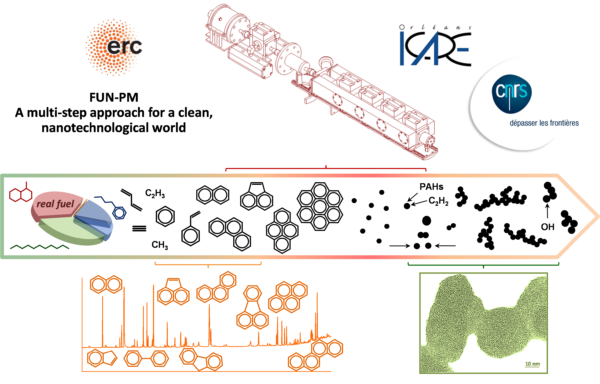 |
ERC-STG-FUN-PM, Dr Andrea Comandini
Fundamental |
Fundamental Understanding of Nanoparticle chemistry: towards the prediction of Particulate emissions and Material synthesis
FUN-PM is an ERC starting grant dedicated to the study of the nanoparticle chemistry at conditions relevant to modern combustion devices. The main goal of the project is to answer many unresolved questions on the complex processes which lead to the formation of nanoparticles. A multi-disciplinary, multi-step approach based on advanced conventional and innovative experimental, modelling, and theoretical techniques is implemented to overcome the limitations of current approaches, resulting in the development of reliable tools for accurate simulations of combustion systems. The research activities, started in February 2018, are conducted at the laboratory ICARE of CNRS, France. The Principal Investigator of FUN-PM is Dr. Andrea Comandini.
| Project summary
The capability of modern societies to reduce harmful particulate emissions from combustion devices and at the same time to take full advantage of flame-based technologies for production of nanomaterials is limited by the inaccuracy of the industrial simulation tools for the design and implementation of practical and efficient solutions. In particular, our fundamental understanding of the nanoparticle chemistry is not only far from being comprehensive but also not sufficient to allow such tools to be accurate and predictive. Nanoparticle formation occurs due the incomplete oxidation of the fossil fuels; it is a very complex, multi-step process driven by the chemistry of unburned hydrocarbons, including formation and growth of polycyclic aromatic hydrocarbons (considered the particle building blocks), nanoparticle nucleation, and subsequent particle growth, agglomeration, and oxidation. Unfortunately, many of these steps are still poorly understood, mainly due to their intrinsic complexity and the limitations in the experimental and theoretical laboratory-based techniques.
|
 |
With the goal of providing answers to the existing long-stand unresolved questions related to the nanoparticle chemistry, a new multi-disciplinary, multi-step approach is considered where the particle formation processes are isolated and studied singularly using a combination of complementary advanced and innovative experimental, theoretical, and modelling techniques. The following objectives will be achieved during the research program:
- experimentally investigate the chemistry of key fuel components and mixtures at conditions relevant to combustion systems using advanced conventional laboratory-based techniques for studies on i) formation of small polycyclic aromatic hydrocarbons, and ii) particle growth and oxidation;
- develop innovative Synchrotron-based techniques to overcome the limitations in the conventional techniques and perform investigations on growth to large polycyclic aromatic hydrocarbons and nanoparticle nucleation;
- develop and validate a comprehensive and detailed chemical kinetic model for nanoparticle chemistry based on the newly obtained experimental results with the support of theoretical calculations and analyses.
The model will constitute a greatly enhanced component of industrial codes for predictive simulations of particulate emissions from modern combustion devices and nanomaterial synthesis in industrial processes, with considerable benefits to the standards of living of European citizens, the environment, and the European Union economy, towards the future of clean energy conversion and novel nanomaterials.
FUN-PM contact
For all questions related to the ERC FUN-PM project, please contact Dr. Andrea Comandini at andrea.comandini_at_cnrs-orleans.fr.
